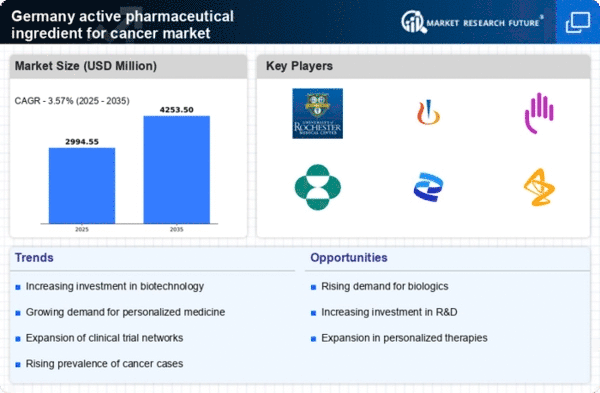Growing Cancer Incidence
The rising incidence of cancer in Germany is a pivotal driver for the active pharmaceutical-ingredient-for-cancer market. Statistics indicate that approximately 500,000 new cancer cases are diagnosed annually, leading to an increased demand for effective treatment options. This surge in cancer cases necessitates the development and production of innovative active pharmaceutical ingredients (APIs) tailored for cancer therapies. As the population ages and lifestyle factors contribute to higher cancer rates, the market for these APIs is expected to expand significantly. The healthcare system's response to this growing challenge includes investments in research and the introduction of new therapies, which further stimulates the active pharmaceutical-ingredient-for-cancer market. Consequently, the need for advanced APIs is likely to remain robust, reflecting the urgency of addressing this public health concern.
Supportive Government Policies
Supportive government policies in Germany play a crucial role in fostering the active pharmaceutical-ingredient-for-cancer market. The German government has implemented various initiatives aimed at promoting innovation in the pharmaceutical sector, including funding for research projects and tax incentives for companies developing cancer treatments. These policies are designed to encourage collaboration between public institutions and private enterprises, facilitating the development of new APIs. Additionally, the regulatory framework in Germany is increasingly favorable, allowing for expedited approval processes for cancer therapies. This supportive environment not only enhances the attractiveness of the active pharmaceutical-ingredient-for-cancer market but also encourages investment from both domestic and international stakeholders, further driving market growth.
Rising Demand for Personalized Medicine
The rising demand for personalized medicine is significantly influencing the active pharmaceutical-ingredient-for-cancer market. Patients and healthcare providers are increasingly seeking treatments tailored to individual genetic profiles, which necessitates the development of specific APIs that can address unique cancer characteristics. In Germany, this trend is reflected in the growing number of clinical trials focused on targeted therapies and biomarker-driven treatments. As the healthcare system shifts towards more personalized approaches, pharmaceutical companies are compelled to invest in the research and development of innovative APIs that align with this demand. This evolution not only enhances treatment efficacy but also positions the active pharmaceutical-ingredient-for-cancer market for substantial growth as it adapts to the changing landscape of cancer care.
Increased Collaboration Among Stakeholders
Increased collaboration among stakeholders is emerging as a vital driver for the active pharmaceutical-ingredient-for-cancer market. Partnerships between pharmaceutical companies, research institutions, and healthcare providers are becoming more prevalent in Germany, fostering an environment conducive to innovation. These collaborations often focus on sharing resources, knowledge, and expertise, which can lead to the accelerated development of new APIs. Furthermore, joint ventures and alliances enable stakeholders to pool their strengths, enhancing the overall efficiency of the drug development process. As the complexity of cancer treatment continues to evolve, such collaborative efforts are likely to play a crucial role in advancing the active pharmaceutical-ingredient-for-cancer market, ensuring that new therapies are developed and brought to market more effectively.
Technological Advancements in Drug Development
Technological advancements in drug development are transforming the landscape of the active pharmaceutical-ingredient-for-cancer market. Innovations such as high-throughput screening, bioinformatics, and artificial intelligence are streamlining the drug discovery process, enabling faster identification of potential APIs. In Germany, pharmaceutical companies are increasingly adopting these technologies to enhance their R&D capabilities. This shift not only accelerates the development of new cancer therapies but also improves the efficiency of existing processes. As a result, the active pharmaceutical-ingredient-for-cancer market is likely to benefit from a more dynamic and responsive development environment. Furthermore, the integration of these technologies may lead to the discovery of novel APIs that can target specific cancer types more effectively, thereby expanding treatment options for patients.






















Leave a Comment